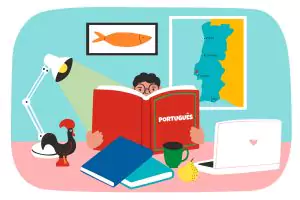Brazil, a vibrant and diverse country in South America, stands out from its neighboring Latin American nations due to its official language, Portuguese. While the majority of Latin America speaks Spanish, Brazil’s linguistic distinction raises an intriguing question: Why does Brazil speak Portuguese? Delving into the historical background, we uncover a fascinating narrative of colonization, exploration, and cultural exchange that shaped Brazil’s linguistic landscape. For those interested in learning Portuguese or exploring more about Latin American languages, language learning websites provide an accessible and interactive way to dive into the rich history and nuances of the region’s languages.

✅ AI Essay Writer ✅ AI Detector ✅ Plagchecker ✅ Paraphraser
✅ Summarizer ✅ Citation Generator
The Portuguese Colonization and the Treaty of Tordesillas
In the 15th century, the era of great explorations, Portuguese explorer Christopher Columbus and others set foot on the New World, sparking a territorial competition between Spain and Portugal. To avoid conflicts, the Treaty of Tordesillas was signed in 1494, dividing the newly discovered lands. According to the treaty, Spain claimed all territories to the west of an imaginary line, while Portugal gained rights to the lands situated to the east.
The consequence of this division had a significant impact on Brazil’s language. While Spain went on to colonize vast parts of Latin America, Portugal received a relatively small portion of land along the eastern coast of present-day Brazil. Despite the initial disadvantage, Portugal’s linguistic influence began to take root in this region.
Brazilwood and Cultural Expansion
The Portuguese colonization of Brazil initially remained limited as they did not recognize the true potential of the land. However, around 1530, explorers discovered that Brazil possessed abundant reserves of Brazilwood, a highly valuable resource at the time. The exploitation of Brazilwood acted as a catalyst for increased Portuguese presence and cultural expansion in Brazil.
As Portuguese settlers migrated inland in search of fertile land, they carried their language and culture with them. The establishment of sugar cane plantations further drove the expansion and solidification of Portuguese influence. This agricultural development, driven by the cultivation of sugar cane, brought a wave of Portuguese-speaking immigrants to Brazil and contributed to the formation of a Portuguese-speaking society.
Formation of Modern Brazil and Language Evolution
Over time, Brazil’s borders expanded, and the country underwent significant historical events, including the gold rush in the late 1600s and the eventual acquisition of independence. Throughout these developments, the Portuguese language remained the dominant means of communication.
As Brazil evolved, the Portuguese language integrated elements from various sources, including native groups, African slaves, and neighboring European settlers. This linguistic assimilation resulted in slight variations in grammar, vocabulary, and pronunciation between Brazilian and European Portuguese. Nonetheless, the languages share a strong similarity and continue to be mutually intelligible.
The Legacy and Cultural Significance
The historical roots of Brazil’s Portuguese language have left an indelible mark on the nation’s cultural fabric. The language serves as a bridge connecting Brazil’s past to its present, reflecting the country’s diverse heritage and historical ties with Portugal. Portuguese is not only a means of communication but also a symbol of national identity, shared traditions, and cultural heritage for the Brazilian people.
Embracing a Linguistic Legacy
Understanding why Brazil speaks Portuguese requires exploring the historical context of colonization, exploration, and cultural exchange. The Treaty of Tordesillas and the discovery of Brazilwood played crucial roles in shaping Brazil’s linguistic landscape, paving the way for Portuguese to become the country’s official language.
Today, as Brazil thrives as a multicultural nation, Portuguese stands as a testament to its rich history and serves as a unifying force for its diverse population. The Portuguese language continues to evolve, adapting to modern times while honoring its roots. This includes everyday interactions, such as the tudo bem greeting and the tudo bem response that is a common part of Brazilian dialogue. Brazil’s linguistic journey is a testament to the intricate interplay between history, culture, and language, making it a captivating subject of study and appreciation.
FAQ
What led to Brazil adopting Portuguese as its official language?
Brazil’s adoption of Portuguese as its official language can be traced back to the country’s colonization by Portugal. When Portugal claimed a small portion of land along the eastern coast of Brazil, Portuguese settlers migrated and established themselves in the region. Over time, the Portuguese language became ingrained in Brazil’s society, culture, and administration. As Brazil gained independence, the language persisted and eventually became the official language of the country.
Did Brazil ever consider adopting Spanish as its language?
No, Brazil did not consider adopting Spanish as its official language. The division of the New World between Spain and Portugal, outlined in the Treaty of Tordesillas, designated Brazil as Portuguese territory. While Spanish became the dominant language in most of Latin America due to Spanish colonization, Brazil maintained its linguistic ties with Portugal. Despite the geographical proximity and cultural interactions with Spanish-speaking nations, Brazil has continued to uphold Portuguese as its official language.
Are there any cultural influences that shaped Brazil’s language choice?
Yes, Brazil’s language choice was influenced by various cultural factors. The Portuguese colonization of Brazil brought Portuguese settlers who introduced their language, customs, and traditions. As Brazil developed economically, the cultivation of sugar cane attracted a significant influx of Portuguese-speaking immigrants, contributing to the expansion and consolidation of the Portuguese language. Additionally, indigenous languages, African languages brought by enslaved populations, and influences from neighboring European settlers have also contributed to the linguistic diversity and evolution of the Portuguese language in Brazil.
How did Portugal’s colonization impact Brazil’s language?
Portugal’s colonization had a profound impact on Brazil’s language. The arrival of Portuguese explorers and settlers marked the beginning of the Portuguese linguistic influence in Brazil. As Portuguese settlers migrated inland, they brought their language and culture, establishing communities and plantations. The cultivation of cash crops like sugar cane further strengthened the Portuguese presence and the spread of the language. Over time, Portuguese became the dominant language, incorporating linguistic elements from native groups, African slaves, and neighboring European settlers. This fusion of influences shaped the evolution of the Portuguese language in Brazil, resulting in the slight variations observed between Brazilian Portuguese and European Portuguese today.
Follow us on Reddit for more insights and updates.
Comments (1)
Welcome to A*Help comments!
We’re all about debate and discussion at A*Help.
We value the diverse opinions of users, so you may find points of view that you don’t agree with. And that’s cool. However, there are certain things we’re not OK with: attempts to manipulate our data in any way, for example, or the posting of discriminative, offensive, hateful, or disparaging material.





Amerigo Vespucci was Porteghese. He couldn’t get funding from Portugal for sailing to the new land. So, he went to the King and Queen of Spain. They offered him funding in exchange for gold, etc. Vespucci was a glorious writer, and wrote about their journey’s in detail. Columbus never made it to America, just to the Caribbean islands. He was mainly sailing to get slaves. Amerigo, on the other hand, wanted to get to know the cultures of the indigenous people they met. Amerigo invented the knot system, which is still well known, for figuring out at what speed the ships were sailing. He also invented new navigation for the ships, to keep them together. After sailing for Spain a few times, Portugal finally relented, and funded Vespucci for his next sailing. This trip landed them in the Country we now call Brazil. Vespucci was Porteghese, and the treaty was made to give that land to Portugal, as they had funded him.
Amerigo Vespucci was a talented writer and artist. The map maker in Europe found a map of the new world made by Amerigo Vespucci, and named it America. Columbus wasn’t happy about it, but the map was out, and obviously the name is still America today. That’s why education is important. Vespucci wasn’t just a Captain, he was also an inventor, reader, writer and politician. He was the first ambassador to bring Spain and Portugal to an amicable agreement.